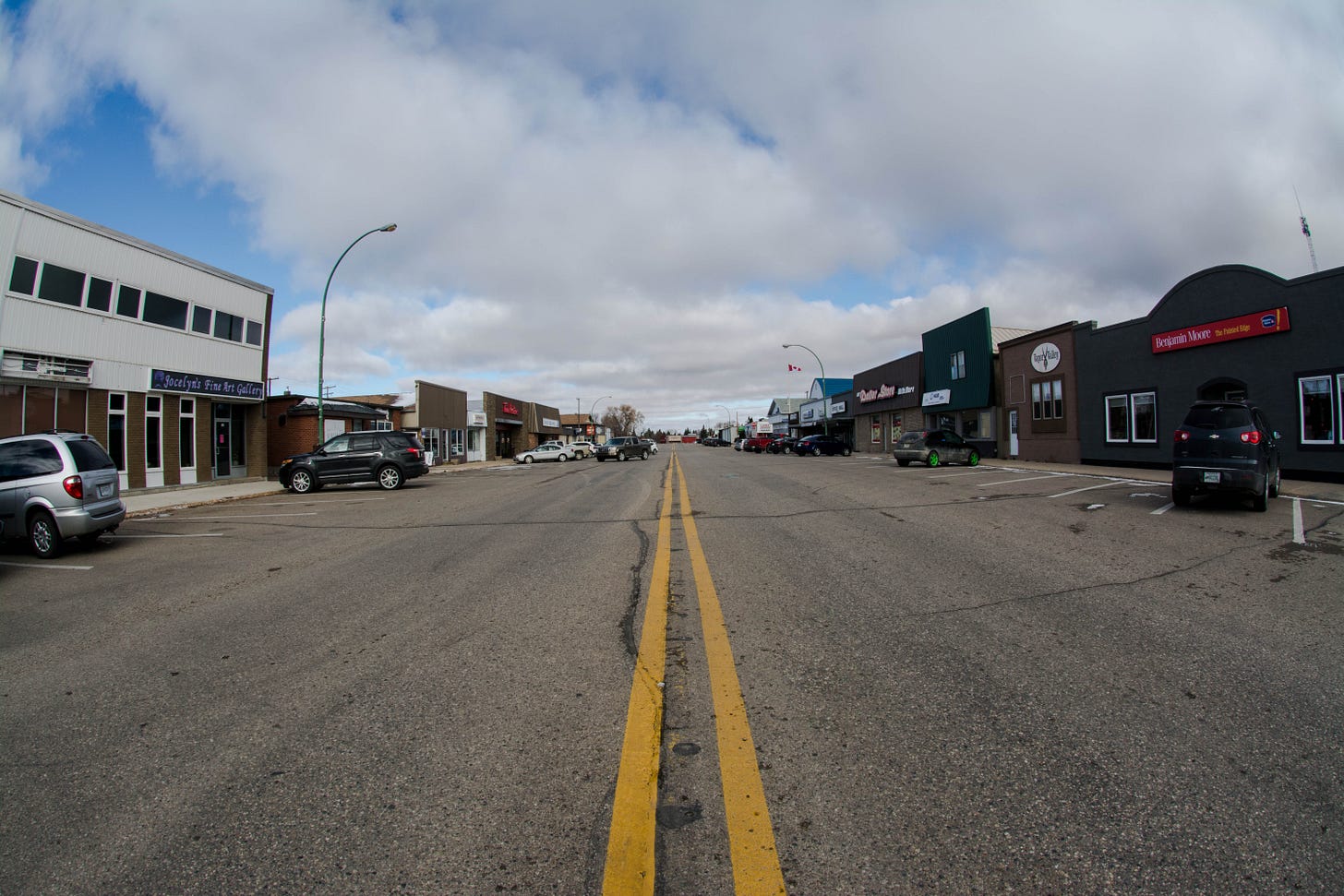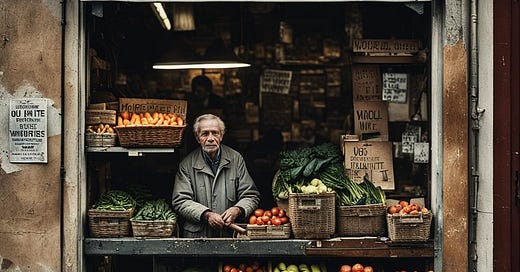Louise Wilson was resolute.
She appeared on April 22, 2023, one of 305 witnesses who testified under oath at the National Citizens Inquiry. The citizen-led, citizen-funded inquiry into the impacts of government responses to COVID-19 was mid-way through its tour of eight Canadian cities, near the end of a grueling third day of hearings in Saskatoon.
Flanked by the flags of Canada and Saskatchewan, Louise told her story to the attending lawyer.
She owned and managed two Dollar Stores in southeast rural Saskatchewan. The stores had been classified as essential; they had been fortunate to be able to stay open throughout COVID. In fact, Louise said, the stores were busier than ever. Everyone “was very afraid of going to the city” and possibly catching the virus.

Her big problem was with the mask mandate, which Saskatchewan introduced twice:
“I knew right away that masks were useless. I’m very informed. I’ve done a lot of research over many years on health issues—and I knew this was ridiculous.”
The first time, she went along with the public health order. When the second mandate came in, Louise refused to wear a mask. And went one further: she sent a memo to her staff instructing that they weren’t to harass customers who were not wearing masks in the store. She also continued her refusal to install floor arrows and Plexiglass barriers, those two staples of the COVID-era shopping experience.
The consequences were swift in coming. Some employees quit, citing fear of an unhealthy workplace. A complaint from another town resident soon brought a visit from a Saskatchewan Health Authority official. Louise was fined $2,800 for refusing to wear a mask. She informed the official that “I was going to fight it out in court.”
Something pinged in me when I heard Louise’s story—like a distant echo from a far away land. Months later, I realized I had encountered a version of it decades before, in Václav Havel’s stunning 1978 essay, “The Power of the Powerless.”
Václav Havel was a Czech playwright and noted dissident involved in the 1968 Prague Spring and the Charter 77 movement. The 1970s were a dismal period for civil rights in Central Europe’s Soviet satellite states. Spontaneous uprisings in the 1950s and 60s had been violently crushed, followed by retrenchment, increasing surveillance, and stultifying submission to Communist rule.
A group known as “dissidents” continued trying to speak about alternative political futures for their countries—with little success. “There came a moment when people thought we were crazy,” Polish Solidarity leader Zbygniew Bujak recalled:
“Why were we doing this? Why were we taking such risks? Not seeing any immediate and tangible results, we began to doubt the purposefulness of what we were doing. Shouldn’t we be coming up with other methods, other ways?
Then came the essay by Havel. Reading it gave us the theoretical underpinnings for our activity.”
The piece arrived like a thunder clap, reverberating for decades.
Central to Havel’s essay was the manager of a fruit and vegetable shop. Each day, the greengrocer placed a poster with the Communist revolutionary slogan “Workers of the world, unite!” amid the fruits and vegetables.
Why did he do this? Not because he believed in unity among the world’s workers, Havel stated, nor because he even thought about the poster’s contents. He did it as a rote action, unthinking, because his political system required it:
“That poster was delivered to our greengrocer from the enterprise headquarters along with the onions and carrots. He put them all into the window simply because it has been done that way for years, because everyone does it, and because that is the way it has to be. If he were to refuse, there could be trouble.”
The greengrocer placed the poster in his window to send a signal: Nothing to be seen here, I’m behaving as expected. He sent it in the form of ideology—what Havel calls “a bridge between the system and the individual,” that pretends “the requirements of the system derive from the requirements of life.”
Millions of individuals like the greengrocer sent myriad signals like his every day. Together, they helped create a panorama of daily life using the same ideology that oppressed them. And they maintained obedience as a norm, becoming both victims and perpetrator of a system Havel called “post-totalitarian.”
Just as bad, they betrayed their potential for life as free human beings:
“Between the aims of the post-totalitarian system and the aims of life there is a yawning abyss: while life, in its essence, moves toward plurality, diversity, independent self-constitution, and self organization, in short, toward the fulfillment of its own freedom, the post-totalitarian system demands conformity, uniformity, and discipline.”
At this stage, there will be objections. What could a liberal democratic society in Saskatchewan, Canada have in common with Communist Central Europe? How could observing a public health measure signal obedience to an ideology? On the first issue, readers are urged patience: a future post will address it at length. I note here only that Havel himself posits a continuity between post-totalitarian and Western democratic societies due to their shared basis in consumerism.
The second question—the ideological nature of mask mandates—is easily answered. Hundreds of scientific studies have found that face masks make little to no difference in preventing the transmission of respiratory viruses. On this point, one could consult extensive reviews by the Cochrane Collaboration or Brownstone Institute.
Or view videos like this one showing the dubious benefits of double-masking:
Or check out this 2018 keynote address to the National Academy of Medicine, in which journalist Laurie Garrett stresses that “the major efficacy of a mask is that it causes alarm.”
Or consult the August 2020 media briefing by World Health Organization Director-General Tedros Adhanom Ghebreyesusin, who states: “By wearing a mask, you’re sending a powerful message to those around you that we are all in this together.”
Or—to return this tour home—review the September 2021 information sheet of the Saskatchewan Human Rights Commission, which advises businesses on how to enforce the renewed mask mandate:
“Given the significant potential health and safety concerns associated with Covid-19, and the possible breach of Public Health Orders by misguided individuals, it is reasonable for a business to require a medical note confirming that the bearer is unable to wear a mask for medical reasons. . . .
You may also want to prominently display your ‘mandatory mask’ policy, along with options for accommodation for persons unable to comply with the mask policy. You will want to make sure your employees are informed about the policy, how to implement it, and what to do when a person wants to enter without a mask.”
History rhymes.
“The Power of the Powerless” draws out the significance of Louise Wilson’s action in a rural Saskatchewan town. She refused to wear a mask herself; refused to impose the sign of a public health ideology on fellow citizens; and refused to contribute to the general tableau of COVID panic by installing floor arrows and plexiglass windows.
She also refused to pay the $2,800 fine.
Resistance was her preferred option.
It was also an option for the greengrocer, according to Havel:
“Let us now imagine that one day something in our greengrocer snaps and he stops putting up the slogans merely to ingratiate himself. He stops voting in elections in he knows are a farce. He begins to say what he really thinks at political meetings. And he even finds the strength in himself to express solidarity with those whom his conscience commands him to support. In this revolt, the greengrocer steps out of living within the lie. He rejects the ritual and breaks the rules of the game. He discovers once more his suppressed identity and dignity. He gives his freedom a concrete significance. His revolt is an attempt to live within the truth.”
The greengrocer has now pierced a hole in a false reality—and his doing so invites others to do the same. The punishment he receives could affect his life and livelihood, even his family. But likely as not, that punishment too will be pursued in a routine, unthinking way, by people who play their roles without conviction.
Which is what Louise also encountered when she fought her fine before a court—and succeeded in having it withdrawn.
Score another one for the good resist.
Further Reading
Václav Havel, “The Power of the Powerless,” Paul Wilson, trans. There are several copies available for free online—for example https://www.nonviolent-conflict.org/wp-content/uploads/1979/01/the-power-of-the-powerless.pdf. Viewed February 12, 2024.
National Citizens Inquiry, Transcript of testimony: Louise Wilson – Apr 22, 2023 – Saskatoon, Saskatchewan. The video can be found at https://nationalcitizensinquiry.ca/witness/louise-wilson/.






someone has said it better but something like - my mere presence makes tptb go insane. That's what Louise and the green grocer refusal to live the lie means to me.
Great piece, Jodi! A welcome and powerful reminder that actions like Louise's invite others to find ways to resist. I look forward to reading more!